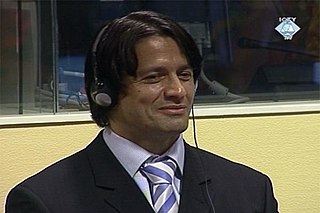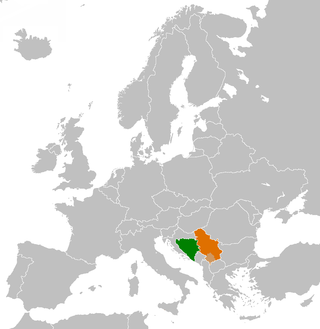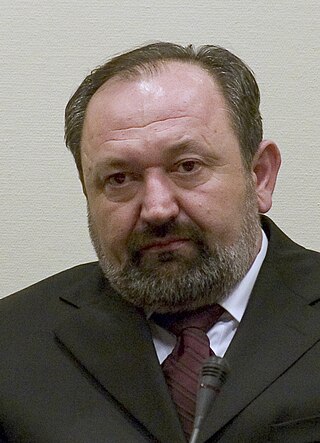Related Research Articles

Srebrenica is a town and municipality in Republika Srpska, Bosnia and Herzegovina. It is a small mountain town, with its main industry being salt mining and a nearby spa.

Naser Orić is a former Bosnian military officer who commanded Army of the Republic of Bosnia and Herzegovina (ARBiH) forces in the Srebrenica enclave in eastern Bosnia surrounded by Bosnian Serb forces, during the Bosnian War.

Republika Srpska is one of the two entities of Bosnia and Herzegovina, the other being the Federation of Bosnia and Herzegovina. It is located in the north and east of the country. Its largest city and administrative centre is Banja Luka, lying on the Vrbas river, and with a population of about 138,963 people.

Foča is a town and municipality in Republika Srpska, Bosnia and Herzegovina. It is located in south-eastern Bosnia and Herzegovina, on the banks of the Drina river. As of 2013, the town has a population of 12,234 inhabitants, while the municipality has 18,288 inhabitants. Foča houses some faculties from the Istočno Sarajevo University. It is also home to the "Seminary of Saint Peter of Sarajevo and Dabar-Bosna", one of seven seminaries in the Serbian Orthodox Church. Foča was also, until 1992, home to one of Bosnia's most important Islamic high schools, the Madrasa of Mehmed Pasha Kukavica. The Sutjeska National Park, which is the oldest National Park in Bosnia and Herzegovina, is located in the municipality.

The Bosnian War was an international armed conflict that took place in Bosnia and Herzegovina between 1992 and 1995. The war is commonly seen as having started on 6 April 1992, following a number of earlier violent incidents. The war ended on 14 December 1995 when the Dayton accords were signed. The main belligerents were the forces of the Republic of Bosnia and Herzegovina, the Republic of Herzeg-Bosnia, and the Republika Srpska, the latter two entities being proto-states led and supplied by Croatia and Serbia, respectively.

The Srebrenica massacre, also known as the Srebrenica genocide, was the July 1995 genocidal killing of more than 8,000 Bosniak Muslim men and boys in and around the town of Srebrenica, during the Bosnian War. The killings were perpetrated by units of the Bosnian Serb Army of Republika Srpska (VRS) under the command of Ratko Mladić. The Scorpions, a paramilitary unit from Serbia, who had been part of the Serbian Interior Ministry until 1991, also participated in the massacre.

The Republika Srpska was a self-proclaimed statelet in Southeastern Europe under the control of the Army of Republika Srpska during the Bosnian War. It claimed to be a sovereign state, though this claim was only partially recognized by the Bosnian government in the Geneva agreement, the United Nations, and FR Yugoslavia. For the first six months of its existence, it was known as the Serbian Republic of Bosnia and Herzegovina.

Milorad Dodik is a Bosnian Serb politician serving as the 8th president of Republika Srpska since 2022, having previously served from 2010 to 2018. He also served as the 7th Serb member of the Presidency of Bosnia and Herzegovina from 2018 to 2022.

The Višegrad massacres were acts of mass murder committed against the Bosniak civilian population of the town and municipality of Višegrad during the ethnic cleansing of eastern Bosnia by Republika Srpska police and military forces during the spring and summer of 1992, at the start of the Bosnian War.

The modern-day countries of Bosnia and Herzegovina and Serbia both originated from Yugoslavia. The majority of population in both countries speak one of the standard varieties of Serbo-Croatian and Serbia is one of the largest investors in Bosnia and Herzegovina.
Emir Suljagić is a Bosnian journalist and politician who is currently the Director of the Srebrenica Genocide Memorial. He served as Minister of Education of Sarajevo Canton from 13 January 2011 until 29 February 2012 and was also Deputy minister of Defense from 31 March 2015 to 10 December 2015.

Report about Case Srebrenica (the first part) was a controversial official report on the July 1995 Srebrenica massacre in eastern Bosnia and Herzegovina. It was prepared by Darko Trifunović and published by the Republika Srpska Government Bureau for Relations with the International Criminal Tribunal for the Former Yugoslavia (ICTY).

Vujadin Popović is a Bosnian Serb war criminal, who participated in the War in Bosnia and Herzegovina and was convicted of genocide, extermination, murder and persecution and sentenced to life in prison. He was Lieutenant Colonel and the Chief of Security of the Drina Corps of the Army of Republika Srpska.
The Prosecutor v. Ratko Mladić was a war crimes trial before the International Criminal Tribunal for the former Yugoslavia (ICTY) in The Hague, Netherlands, concerning crimes committed during the Bosnian War by Ratko Mladić in his role as a general in the Yugoslav People's Army and the Chief of Staff of the Army of Republika Srpska.

UDIK, the Association for Social Research and Communications, is the Bosnian non-governmental organization with offices in Sarajevo and Brčko. It was founded in 2013 by Edvin Kanka Ćudić. Organization aimed to gather facts, documents, and data on genocide, war crimes, and human rights violations in Bosnia and Herzegovina and the former Yugoslavia.

Bosnian genocide denial is the act of denying the occurrence of the systematic Bosnian genocide against the Bosniak Muslim population of Bosnia and Herzegovina, or asserting it did not occur in the manner or to the extent that has been established by the International Criminal Tribunal for the former Yugoslavia (ICTY) and the International Court of Justice (ICJ) through proceedings and judgments, and described by comprehensive scholarship.
Events in the year 2018 in Bosnia and Herzegovina.

Draško Stanivuković is a Bosnian Serb politician serving as mayor of Banja Luka since December 2020. He is a member of the Party of Democratic Progress.

Jelena Trivić is a Bosnian Serb politician in Republic of Srpska and university professor who served as member of the National Assembly of Republika Srpska from 2018 to 2022. She was vice president of the Party of Democratic Progress, until she left it in 2023 to establish the People's Front.
References
- ↑ "Contributors". malagurski.com/srpska. Retrieved 6 February 2023.
- 1 2 "World premiere of film about Republika Srpska: Citizens supported the initiative". vecernjenovosti.ba (in Serbian). Retrieved 6 February 2023.
- ↑ "World and City Leaders Notified About the Petition to Stop the Screening of the Film "Republic of Srpska: Struggle for Freedom" by a Serbian-Canadian Director Boris Malagurski". Institute For Research of Genocide Canada (IGC). 31 October 2022. Retrieved 7 February 2023.
- 1 2 3 "Protesters call for cancellation of 'revisionist' Serb film - Crimes Against Humanity News". Al Jazeera. 16 October 2022. Retrieved 7 February 2023.
- ↑ Gadzo, Mersiha (10 January 2022). "Protesters call for action to prevent Bosnia sliding into war - Protests News". Al Jazeera. Retrieved 7 February 2023.
- 1 2 Kurtic, Azem (13 October 2022). "Petition Targets Bosnian Serb History Film for 'Genocide Denial'". Balkan Insight. Retrieved 7 February 2023.
- ↑ "Srebrenica Mothers Asking for Boris Malagurski's Film to be Banned". n1info.ba (in Bosnian). Retrieved 6 February 2023.
- 1 2 "Important Statement". malagurski.com (in Serbian). Retrieved 6 February 2023.
- 1 2 "The Bosniak Diaspora On Alert Over Film About RS". politika.rs (in Serbian). Retrieved 6 February 2023.
- 1 2 "'The SVP! The only party that understands us!". tagesanzeiger.ch (in German). Retrieved 7 February 2023.
- ↑ "Why Serbian nationalism is dangerous - also in Switzerland". tagesanzeiger.ch (in German). Retrieved 7 February 2023.
- ↑ "Tages-Anzeiger is helping Bosnian and Albanian organizations to cancel a documentary". weltwoche.ch (in German). Retrieved 7 February 2023.
- ↑ "Statement on the Broadcasting of the Documentary Republika Srpska: The Struggle for Freedom". Lemkin Institute. 4 November 2022. Retrieved 13 January 2023.
- 1 2 3 "A feel-good movie for Serbian nationalists". hessenschau.de (in German). Retrieved 6 February 2023.
- ↑ "Interview - Boris Malagurski: About his controversial film, genocide, Srebrenica Mothers". okanal.oslobodjenje.ba (in Bosnian). Retrieved 6 February 2023.
- ↑ "Boris Malagurski: I respect the Hague, I was in Potočari". oslobodjenje.ba (in Bosnian). Retrieved 6 February 2023.
- ↑ "Vildana Selimbegovic: Sarajevo's Sadness and Shame". oslobodjenje.ba (in Bosnian). Retrieved 6 February 2023.
- ↑ Majić, Danijel (5 November 2022). "Filmski melem za srpske nacionaliste – DW – 5. 11. 2022". dw.com (in Serbian). Retrieved 9 February 2023.
- ↑ Anadolu Agency (18 October 2022). "Serbian-Canadian director accused of whitewashing Bosnia war in film". Daily Sabah. Retrieved 13 January 2023.
- ↑ "Past Screenings". malagurski.com (in Serbian). Retrieved 6 February 2023.
- ↑ "Malagurski: Film 'Srpska: The Struggle for Freedom' targeted by extremists, they're intimidating cinemas". kosovo-online.com (in Serbian). Retrieved 7 February 2023.
- ↑ "Turkish Diaspora Enabled Controversial Film about RS by Boris Malagurski to be Screened in Dortmund". klix.ba (in Bosnian). Retrieved 7 February 2023.
- ↑ "More perspectives on the Balkan wars are needed in the historiography". samnytt.se (in Swedish). Retrieved 7 February 2023.